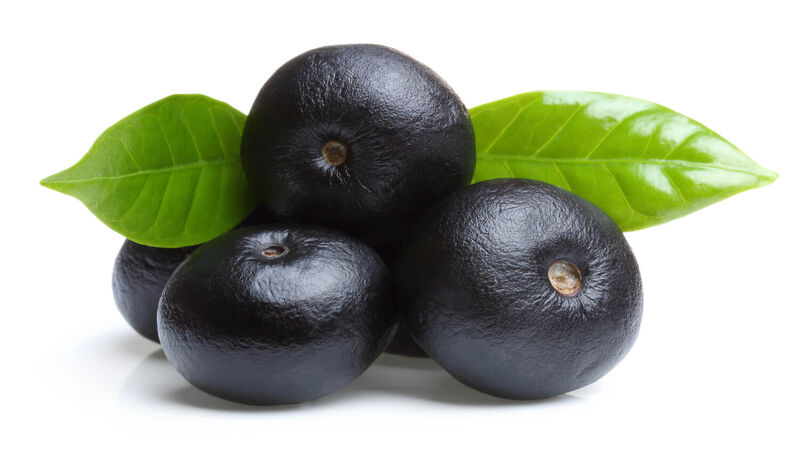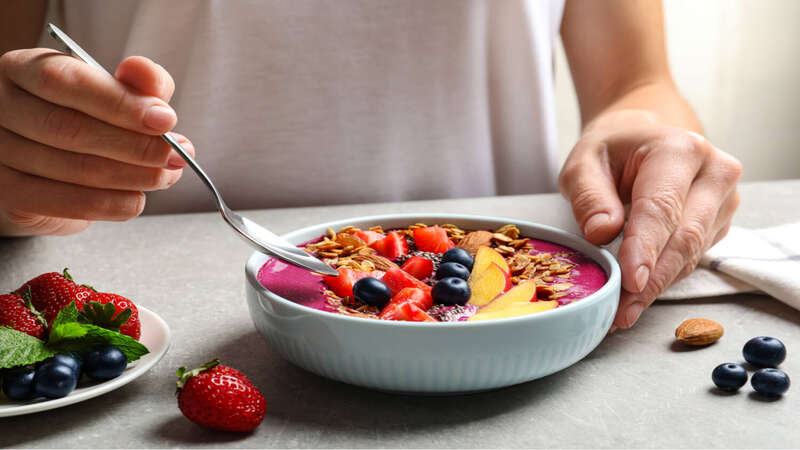
Berries are highly beneficial, but some are not recommended during pregnancy. Acai berries, known as the “superfruit” are generally consumed regularly for various health conditions. Several studies have shown that the pulp of acai fruit contains more antioxidants than cranberries, raspberries, blackberries, strawberries, and blueberries. So, is it safe to consume Acai berries during pregnancy?
Several health benefits of acai berries have been claimed, including improved skin appearance and weight loss, but not all of these claims are supported by scientific evidence. This Article provides health benefits and possible side effects to be expected while adding acai berry to the pregnancy diet.
Video of Amazing Benefits of Consuming Acai Berry During Pregnancy
What is Acai Berry?
Acai berry is an inch-long fruit from the Acai palm tree. It is reddish-purple in color and is common in the Central and South American regions.
Acai berry is very well known for its distinctive taste and anti-aging properties. It is believed to contain high levels of antioxidants, even higher than what you find in cranberries, blueberries, or strawberries.
Is it Safe to Consume Acai Berries During Pregnancy?
There have been very few studies about the effect of Acai berries during pregnancy. However, fresh or frozen Acai berries are considered safe to eat during pregnancy. However, pregnant women who are allergic to berries, pollen, or other fruits it is best to check with their doctor to confirm they are safe for them. Never take a chance during pregnancy.
Also, ensure you do not consume the unfiltered or unpasteurized Acai juice as it can lead to Chagas disease (1), which can be transferred to the baby inside. This can result in premature birth or low birth weight.
Consuming Acai berry powder has to be limited, especially when you are pregnant. The reason is, when the berries are dried and made into a powder, the water content is lost, and the powder is highly concentrated.
It is always safer to check with your doctor, who can suggest how much of this powder you can consume in a day.
5 Health Benefits of Acai Berry During Pregnancy

Regular consumption of Acai berries helps to promote overall health, including your skin. During pregnancy, you can consume it in moderation for the following health benefits:
1. Promotes Heart Health
Acai berries are a good source of plant antioxidants called anthocyanins. (2). These antioxidants help remove harmful free radicals from the body and keep the heart healthy. They help manage cholesterol, cutting the risk of stroke, heart attack, and blocked arteries. During Pregnancy, acai berries can be extra helpful because they have sterols that relax your blood vessels and help lower high blood pressure.
2. Helps to Strengthen Immunity
During pregnancy, it is important to have a strong immune system. Your body needs to work harder to protect you and your growing baby. Acai berries are rich in antioxidants, vitamins (like vitamin C), and minerals that help support and strengthen your immune system. It also has anti-inflammation properties. (3). Thus, having acai berries during pregnancy helps to fight off infections and reduce inflammation, which can be helpful since pregnancy can sometimes weaken your immune response.
3. Acai Berry is Great for Digestion
Eating acai berries can be a tasty and natural way to support healthy digestion while you’re pregnant. During pregnancy, digestion can slow down due to hormonal changes, which may cause problems like bloating or constipation. Acai berries are high in fiber (4), which helps keep your digestive system moving smoothly. This can make it easier to have regular bowel movements and prevent constipation, which is common during pregnancy. A pregnant woman having diarrhea in their first trimester can try eating acai berry, which helps to bulk up stool and bring things back to normal.
4. Helps To Boost Energy
Pregnancy places increased demands on a woman’s body, often leading to fatigue and low energy levels. Acai berries can be a healthy snack during pregnancy and may help boost your energy naturally. The natural sugars in acai can give you a gentle energy lift without the crash that comes from processed sugar or caffeine.
5. Helps With Bone Health
During pregnancy, getting enough calcium is essential for both the mother and the developing baby. Calcium supports the formation of the baby’s bones and teeth, helps the heart, nerves, and muscles develop properly, and also protects the mother’s bone density as the baby draws calcium for its growth. Acai berries are a nutrient-rich fruit that contains a type of calcium that is easily absorbed by the body. This means that when you eat acai during pregnancy, your body can efficiently use that calcium to support your baby’s skeletal development. At the same time, it helps maintain your bone strength and overall health.
Consuming Acai Berries During Pregnancy: Things to Consider

Acai berries are often touted for their health benefits due to their high antioxidant content. However, like any food, it’s important to be cautious about their consumption during pregnancy. Here are some potential side effects to be aware of when eating acai berries while pregnant:
1. Allergic Reactions
While rare, allergic reactions to acai berries can occur. If you experience symptoms like itching, hives, rashes, or swelling of the lips, mouth, or tongue, it’s important to stop consuming them and consult your doctor immediately. Allergies during pregnancy can be more unpredictable, so it’s essential to monitor any new food reactions closely.
2. Miscarriage Risk (Uterine Contractions)
There is no strong evidence directly linking acai berries to miscarriage; however, consuming large quantities of some foods during pregnancy can potentially trigger uterine contractions. While moderate consumption of acai is generally safe, it’s best to limit intake. If you have concerns, it’s best to consult your healthcare provider.
3. Gastrointestinal Problems
Acai berries are rich in fiber, which can support digestion. However, excessive consumption may lead to gastrointestinal discomfort, including diarrhea or bloating. Pregnant women are often more sensitive to digestive changes, so it’s important to monitor how your body reacts to high-fiber foods like acai.
4. Blood Sugar Levels
Acai berries contain natural sugars that may affect blood sugar levels. Studies suggest that acai could influence fasting blood glucose levels, which may impact women with gestational diabetes. Additionally, when acai berries are juiced, the fiber content is often reduced, which can lead to a quicker spike in blood sugar levels. If you have gestational diabetes or any concerns about blood sugar control, it’s a good idea to consult your doctor before consuming acai juice or large amounts of acai.
5. Headaches
Pregnancy can make women more sensitive to certain foods, including acai berries. Some individuals may experience headaches if their bodies are unable to properly digest acai. (5). If you notice headaches or other discomforts after eating acai, you may want to limit your intake or avoid it altogether and speak with your doctor about potential alternatives.
Ways to Consume Acai Berry in Your Pregnancy Diet

There are many ways to enjoy this super fruit as a part of your diet during pregnancy:
1. Fruit Bowl or Juice
Add the frozen fruit to a bowl of fruits, or just have the juice. You can munch it for those sudden pregnancy cravings too.
2. Acai Berry Smoothie
A handful of Acai berries, a few other berries of your choice blended with a banana, and some milk or water can be a great smoothie on the go.
Very little research has been conducted about consuming Acai berry during pregnancy or breastfeeding. So, it is safer to consult your doctor before consuming this fruit. This is important if you are relying on the powdered or frozen form of Acai berry rather than the fresh ones.
FAQs
1. Does Acai Have Folic Acid?
Yes, it contains a good quantity of folic acid.
2. Can I be Allergic to Acai Berries?
Yes, if you have a pollen allergy or are allergic to other berries, you can be allergic to Acai berries as well.
3. Can I Eat Acai Every Day?
Very little research is available about consuming Acai during pregnancy. Therefore, it is not a great idea to overload on this fruit.
4. Can Consuming Acai Berry Everyday Replace my Folic Acid Medication?
Acai berries are rich in folic acid. However, you cannot skip you prenatal vitamins or folic acid supplements on this account. Also, consuming too much of any fruit is not a good idea when pregnant.
5. Can Acai Berry Lead to an Abortion?
Consuming high quantities of acai berries is believed to cause uterine contractions. This may cause a miscarriage. If you love the taste, have Acai in moderation.
6. Can I Have Acai Berries to Control Weight Gain During Pregnancy?
Acai berries can make you feel full for a long period of time. This can suppress your appetite, thus resulting in weight loss. Pregnancy is not a time to eat foods to lose weight. Eat what is good for you and feels right for your tongue.
7. Can Acai Berries Help Relieve Constipation During Pregnancy?
Yes, they can. Acai berries are rich in fiber. It can help you pass stool easily.
8. Can I Have Acai Berry Tea Everyday When Pregnant?
Acai berries are a rich source of antioxidants and other nutrients. You can have acai tea regularly. However, consult your doctor before you start having it every day.
References
- U.S. Department of Health and Human Services – https://www.nccih.nih.gov/health/acai
- Science Direct, Acai Berries – https://www.sciencedirect.com/topics/agricultural-and-biological-sciences/acai-berries
- Pirozzi AVA, Imbimbo P, D’Agostino A, Tirino V, Finamore R, Monti DM, Piccoli R, Schiraldi C. Antioxidant and Hypolipidemic Activity of Açai Fruit Makes It a Valuable Functional Food. Antioxidants (Basel). 2020 Dec 31;10(1):40 – https://pmc.ncbi.nlm.nih.gov/articles/PMC7824079/
- Medically reviewed by NKF Patient Education Team – https://www.kidney.org/kidney-topics/acai-berries#
- Netmeds, Acai Berry: Health Benefits, Nutrition, Recipes And Side Effects – https://www.netmeds.com/health-library/post/acai-berry-health-benefits-nutrition-recipes-and-side-effects#
